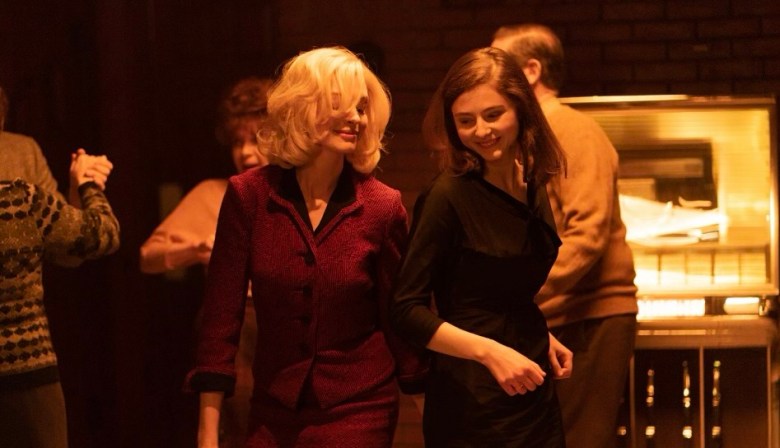Emma Stone and Mark Ruffalo in Poor Things.
I don’t know what it says about me that many of my favorite films of this year are about misanthropes or innocents learning to accept the world as it is and embrace it, but perhaps I’ll take that on board as a New Year’s resolution. I also don’t know what it says that many of my favorites have proven slightly divisive for various reasons, but no matter. It’s all opinion, and I don’t consider my interpretations as any sort of absolute truth for anyone other than myself. With that in mind, here are my ten favorite films of 2023, plus some honorable mentions.

10. The Iron Claw (directed by Sean Durkin, rated R)
I am not a big wrestling fan, but what I am a fan of is fantastic direction and stellar acting, and The Iron Claw has both. Sean Durkin’s natural disposition of restraint actually helps the story of the Von Erich brothers come to life in a fuller way which never feels cloying and always feels authentic. Their story is so tragic that Durkin even cut a fair bit out so the film wouldn’t feel repetitive. In any event, The Iron Claw tells a very sad story with a very subtle touch, and that, combined with Zac Efron’s quietly powerful performance as Kevin Von Erich, leads to an ending which packs a bigger punch than anything these brothers faced in the ring. (Now in theaters)

9. American Fiction (directed by Cord Jefferson, rated R)
Jeffrey Wright delivers a career-defining masterclass in acting as Thelonious “Monk” Ellison, a slightly misanthropic, down-on-his-luck novelist. He sees many of his more successful fellow African-American writers’ work as pandering, trafficking in harmful racial tropes and stereotypes. In response and partly as a joke, he writes a novel stuffed with these tropes, and in Producers fashion, it becomes a success. The ensuing satire is extremely insightful and often hilarious, but the family drama that rounds out the film is perhaps its best quality. Monk eventually softens as a result of a tragedy which occurs early on in the film, but whether that softening is ultimately a good thing for his art is up for debate. (Now in limited release, in theaters nationwide soon)

8. Barbie (directed by Greta Gerwig, rated PG-13)
Perhaps the film that took all the biggest risks this year, Barbie is that rare example of a gigantic Hollywood blockbuster which doesn’t feel too terribly interfered with (although I’m sure it was picked apart by producers and executives while it was being made). My point is, it feels as close to Greta Gerwig’s unvarnished vision as possible. Major kudos to Margot Robbie, not only for her inspired performance as the eponymous doll, but also for producing the film and only agreeing to participate if they could get Gerwig. It’s a stroke of brilliance Gerwig repays in so many ways, from the comedy to the Kens (Ryan Gosling is undeniably phenomenal here) to the cool undertones of humanistic exploration. (Now streaming on Max)

7. Earth Mama (directed by Savanah Leaf, rated R)
Playing pregnant single mother Gia, Tia Nomore shines under Savanah Leaf’s steady and groundbreaking direction. Earth Mama is the clearest recent example of Roger Ebert’s notion of films being “machines for empathy.” Everyone is empathized with in this story, from Gia to her two children in foster care, to the family interested in adopting Gia’s new baby, to even the most seemingly random of families and couples getting their picture taken at the mall portrait studio where she works. Leaf takes quiet time to give everyone a little backstory, even if it’s just visually. In other hands, this approach might come across as unfocused, but Leaf nails every scene, bringing us to see deeper emotional pictures and connections in every frame. (Now available on all video-on-demand platforms)

6. Afire (directed by Christian Petzold, not rated)
This is another story about a misanthropic writer, but this time centered on a younger and much less successful one. Christian Petzold has been one of cinema’s most talented voices for quite some time, and in Afire, he excels at allowing us to explore the dynamics of behavior rather than focusing on the absurdity of the situation. Leon (Thomas Schubert) has been working on a terrible (from what we hear of it) novel called “Club Sandwich,” which his lovely vacation acquaintance Nadja (Paula Beer) slams. We might initially think she’s been rude in this instance, but Petzold subtly reveals just how wrong Leon is about pretty much everything. Unlike American Fiction, there is looming tragedy in Afire right up to the very end, but both films are about the challenges inherent in broadening one’s perspective and trying to be more optimistic. (In German with English subtitles, now streaming on The Criterion Channel)

5. Eileen (directed by William Oldroyd, rated R)
Luke Goebel and Ottessa Moshfegh adapt Moshfegh’s acclaimed novel into a searing wintry noir set in 1960s Massachusetts. It might feel like a minor work if director William Oldroyd wasn’t so adept at capturing a theme. I’ve heard there are some notable differences between the book and the film, but I have not yet read the book, so I don’t begrudge anyone who has felt disappointed with this film. If anything, the film makes me more intrigued and excited to read what I’ve been missing! In any case, I adore the three central performances here. Thomasin McKenzie is perfectly cast as the meek, yet brimming-with-possibility title character, and when psychologist Rebecca (Anne Hathaway) strolls into the boys’ prison where Eileen works, their will they/won’t they chemistry kicks into high gear right away. We’re following two very quiet, but very observant and secretly cunning people, and this quiet intensity culminates in one of the most gripping endings of 2023. No matter what you might think of the wild turn the story takes, Marin Ireland gives the best one-scene performance of the year. I won’t say who she plays so as not to spoil it, but in a just world, that single scene would earn her an Oscar nomination. (Coming January 2nd to all video-on-demand platforms)

4. Asteroid City (directed by Wes Anderson, rated PG-13)
Does the claim that Wes Anderson gets more Wes Anderson-y with every film hold true? Yes, but Asteroid City is also one of his boldest thematic ventures. It’s about apathy and how to break out of it. It’s about what it feels like to live in America right now (or at least what it feels like when you heavily engage with the news). It’s also about an actor named Jones Hall (Jason Schwartzman) grieving. There are a few of the Anderson trademark framing devices here, but these are rather consistent and cohesive in Asteroid City so as to build on the film’s central conceit. We’re essentially watching a play within a play, and Anderson is asking us which of these two stories is more important and/or meaningful. Is it still meaningful or useful to search for some escapism in our times? I would argue yes, and Anderson clearly agrees. Add to all those fun and interesting layers the fact that this is technically Anderson’s first western, and it looks absolutely gorgeous, almost like a Norman Rockwell painting put on its feet on Broadway. (Now streaming on Prime Video)

3. All Dirt Roads Taste of Salt (directed by Raven Jackson, rated PG)
All Dirt Roads is a film which probably won’t be to everyone’s taste (forgive the pun) because of its extremely patient and quiet approach. Raven Jackson’s debut feature is adept at tenderly finding moments of humanity and moments of the natural world and focusing on them for long stretches, sometimes five minutes at a time or more, and having that time spent truly mean so much. Herself a poet, Jackson’s direction is in a poetic register which stunningly never sacrifices substance for style. As Mack (Charleen McClure) remembers her life from childhood to adulthood in rural Mississippi, we see themes of grief, love, tragedy, and hope, all through the watchful, thoughtful eyes of a fresh new filmmaking voice whose quiet speaks volumes. One early scene that stands out for me is a dance between Mack’s mother Evelyn (Sheila Atim) and father Isaiah (Chris Chalk). It’s a transportive moment of romance as seen through young Mack’s (Kaylee Nicole Johnson) eyes, and it sets the tone for how we then continue fluidly moving through her life. The film’s climax is also quiet, but if this sounds like a film you’d enjoy, it will truly rock you. Of any film in my top ten this year, All Dirt Roads Taste of Salt is the one I most hope audiences discover and cherish for years to come. (Coming January 2nd to all video-on-demand platforms)

2. Past Lives (directed by Celine Song, rated PG)
I’m so thrilled that Past Lives has connected with audiences as well as it has. Celine Song’s debut feature is just brimming with delicate honesty and catharsis all the way through. Song’s autobiographical story follows Nora (Greta Lee), a theatrical artist who emigrated from South Korea to Canada as a child. Her childhood sweetheart Hae Sung (Teo Yoo) was left behind. In a tender, beautiful sequence, they reconnect online, and eventually Hae Sung visits Nora in adulthood, after she has moved to New York City and married Arthur (John Magaro). Thankfully, there’s never the stereotypical threat of unearned conflict between the members of this love triangle, and Hae Sung never tries to force something that wasn’t meant to be. But Nora does wonder at times, as we all do regarding our past selves, our past lives. (Now available on all video-on-demand platforms)

1. Poor Things (directed by Yorgos Lanthimos, rated R)
Emma Stone gives the performance of the year as Bella Baxter, a Frankenstein-esque experiment gone rogue after meeting the scoundrel Duncan Wedderburn (Mark Ruffalo). Lanthimos has certainly impressed me in the past, but this really is his magnum opus. Adapted from the novel by Alasdair Gray, Poor Things is a fantastical exploration of both patriarchal possessiveness and what it means to be alive as a human being, with immaculately weird set design and reflexive, self-effacing arch comedy to boot. Ruffalo has publicly admitted to having been scared to take on such a villainous role, but he plays it perfectly, and even the fact that he’s an out-of-left-field choice for the part speaks to the film’s themes. Poor Things is partly about how we’re all shunted into certain roles, almost at birth, and like a caterpillar’s journey to becoming a butterfly, we all must spread our wings, even if that comes with certain consequences. Stone is simply phenomenal here. Bella is such a layered, technical task of a character, and if you’re not looking for them, you won’t see any of the strings behind that performance. She inhabits the role with equal measures of grace, vulgarity, and pride, and the film is just as much her magnum opus as it is Lanthimos’. (Now in theaters)
Honorable mentions:
Oppenheimer
Nimona
Spider-Man: Across the Spider-Verse
The Beasts
The Artifice Girl
Lakota Nation vs. United States
Teenage Mutant Ninja Turtles: Mutant Mayhem
The Royal Hotel | George Napper
